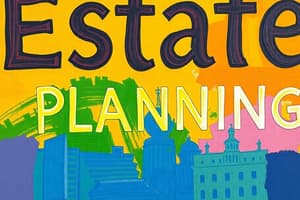Podcast
Questions and Answers
Which of the following best describes the primary purpose of estate planning?
Which of the following best describes the primary purpose of estate planning?
- Minimizing annual income tax liabilities.
- Maximizing investment returns during one's lifetime.
- Ensuring all debts are paid off before retirement.
- Establishing a definite plan for administering and disposing of one's property during life and after death. (correct)
What are the two main components of estate planning?
What are the two main components of estate planning?
- Managing investments and selecting a guardian for children.
- Establishing trusts and avoiding family disputes.
- Creating a will and minimizing taxes.
- Building your estate through savings, investments, and insurance, and transferring your estate at death in the manner specified. (correct)
What is the likely outcome if someone dies intestate?
What is the likely outcome if someone dies intestate?
- Their estate will be distributed through the legal system according to provincial laws. (correct)
- Their estate planning is handled privately in a closed setting.
- Their estate will escheat (revert) to the federal government.
- Their estate will automatically be transferred to a charity of the court's choosing.
Why is it generally recommended to create an estate plan while in good health?
Why is it generally recommended to create an estate plan while in good health?
Which of the following documents is generally NOT required as proof of claims upon death?
Which of the following documents is generally NOT required as proof of claims upon death?
What is the legal term used to describe the state of dying without a valid will?
What is the legal term used to describe the state of dying without a valid will?
How might marriage affect an existing will?
How might marriage affect an existing will?
What is the primary role of an executor of a will?
What is the primary role of an executor of a will?
Which clause in a will identifies the testator and revokes all prior wills?
Which clause in a will identifies the testator and revokes all prior wills?
What is the purpose of a 'Life Interest Clause' in a will?
What is the purpose of a 'Life Interest Clause' in a will?
What is the purpose of a 'Survival Clause' in a will?
What is the purpose of a 'Survival Clause' in a will?
In Ontario, if a person dies intestate and leaves behind a spouse and one child, how is the estate typically distributed?
In Ontario, if a person dies intestate and leaves behind a spouse and one child, how is the estate typically distributed?
Which type of will is entirely handwritten and requires no witnesses?
Which type of will is entirely handwritten and requires no witnesses?
In which province is a Notarial Will available?
In which province is a Notarial Will available?
What is the legal process of proving a will is valid in court called?
What is the legal process of proving a will is valid in court called?
Which of the following is NOT a typical responsibility of an executor?
Which of the following is NOT a typical responsibility of an executor?
If you have minor children, what is a critical reason to have a will?
If you have minor children, what is a critical reason to have a will?
What is the purpose of a codicil to a will?
What is the purpose of a codicil to a will?
What is a 'Living Will' primarily designed to do?
What is a 'Living Will' primarily designed to do?
What happens to a conventional Power of Attorney (POA) in the event of the grantor's legal incapacity?
What happens to a conventional Power of Attorney (POA) in the event of the grantor's legal incapacity?
What documents are required when a person dies?
What documents are required when a person dies?
Which of the following is an example of what last letter instructions should include?
Which of the following is an example of what last letter instructions should include?
What is generally true of a letter of last instruction?
What is generally true of a letter of last instruction?
What is a trust?
What is a trust?
What is the person who creates a trust called?
What is the person who creates a trust called?
What is a Living (Inter Vivos) Trust?
What is a Living (Inter Vivos) Trust?
What are trusts benefits?
What are trusts benefits?
What does making an inventory of an estate include?
What does making an inventory of an estate include?
What will happen if you do not have a will?
What will happen if you do not have a will?
What is a testator?
What is a testator?
Which asset is not distributed by will?
Which asset is not distributed by will?
If a person dies intestate and has a spouse and children, who gets what?
If a person dies intestate and has a spouse and children, who gets what?
Which is the document that dispenses emotional and spiritual wealth to heirs and is not legally binding?
Which is the document that dispenses emotional and spiritual wealth to heirs and is not legally binding?
What are the holographic will requirements?
What are the holographic will requirements?
Which type of trust is established by their creator's will that becomes effective on death?
Which type of trust is established by their creator's will that becomes effective on death?
What are some responsibilities of an executor?
What are some responsibilities of an executor?
Which document is designed to enable an individual, while well, to express the intention that life be allowed to end if they become terminally ill?
Which document is designed to enable an individual, while well, to express the intention that life be allowed to end if they become terminally ill?
Flashcards
What is Estate Planning?
What is Estate Planning?
A definite plan for the administration and disposal of one's property during one's lifetime and at one's death.
Two components of estate planning
Two components of estate planning
Building your estate through savings, investments, and insurance; and transferring your estate at death as specified.
What happens if you die Intestate?
What happens if you die Intestate?
If you die without a will, your estate is distributed through the legal system.
Important papers for estate planning
Important papers for estate planning
Signup and view all the flashcards
What is a will?
What is a will?
Signup and view all the flashcards
What happens if you die intestate?
What happens if you die intestate?
Signup and view all the flashcards
What does the Identification and Revocation Clause do?
What does the Identification and Revocation Clause do?
Signup and view all the flashcards
Appointment of Executor meaning
Appointment of Executor meaning
Signup and view all the flashcards
Life Interest Clause
Life Interest Clause
Signup and view all the flashcards
What happens when someone dies intestate in Ontario?
What happens when someone dies intestate in Ontario?
Signup and view all the flashcards
What is a Holographic Will?
What is a Holographic Will?
Signup and view all the flashcards
What is a Formal Will?
What is a Formal Will?
Signup and view all the flashcards
What is Notarial Will?
What is Notarial Will?
Signup and view all the flashcards
Who is a Beneficiary?
Who is a Beneficiary?
Signup and view all the flashcards
What is Probate?
What is Probate?
Signup and view all the flashcards
Responsibilities of an executor
Responsibilities of an executor
Signup and view all the flashcards
Who is a Trustee?
Who is a Trustee?
Signup and view all the flashcards
Who can draft a Will?
Who can draft a Will?
Signup and view all the flashcards
What is a Codicil?
What is a Codicil?
Signup and view all the flashcards
What is a Living Will?
What is a Living Will?
Signup and view all the flashcards
What is a Power of Attorney?
What is a Power of Attorney?
Signup and view all the flashcards
What is a Letter of Last Instruction?
What is a Letter of Last Instruction?
Signup and view all the flashcards
What is a Trust?
What is a Trust?
Signup and view all the flashcards
Who is a Settlor?
Who is a Settlor?
Signup and view all the flashcards
Living (Inter Vivos) Trust
Living (Inter Vivos) Trust
Signup and view all the flashcards
What is a Testamentary Trust?
What is a Testamentary Trust?
Signup and view all the flashcards
What is included in your Estate?
What is included in your Estate?
Signup and view all the flashcards
Assets held in Joint Tenancy and Beneficiaries
Assets held in Joint Tenancy and Beneficiaries
Signup and view all the flashcards
Why is Estate Planning important?
Why is Estate Planning important?
Signup and view all the flashcards
Types of Will Formatting
Types of Will Formatting
Signup and view all the flashcards
Study Notes
Personal Aspects of Estate Planning
- Estate planning involves having a definite plan for administering and disposing of one’s property during life and after death
- Estate planning components include building an estate through savings, investments, and insurance
- Estate planning components include transferring an estate at death in a specified manner
- A will and trust agreements are ways to implement estate planning
- Knowledge in estate planning areas and good record-keeping are helpful
- Getting married voids a will made prior to the marriage
- Divorce or separation may affect the validity of a will
- Estate planning has an impact on capacity to order the disposition of a will
- Dying without a will (intestate) means the estate is distributed through the legal system
- Daily living can hinder thinking about death and estate planning
- Rationalizing delays estate planning because people are unsure what information is needed
- Estate planning should occur while in good health
Legal Aspects of Estate Planning
- Proof of claims must be produced upon death
- Important papers to maintain include birth and marriage certificates, legal name changes, and military service records
- A will is the legal declaration of a person’s mind as to the disposition of property after death
- Dying intestate results in provincial law of descent and distribution acts as a will
- Spouses receive preferential share and balance is distributed to dependents when intestate
- Marriage and divorce affect wills
- Reviewing a will with an attorney is important due to marriage and divorce
- Marriage may revoke wills
- Preparing a standard will can cost $400 or more; costs vary with complexity
Will Clauses
- Identification and Revocation Clause identifies the residence and declares the will as the last will
- Appointment of Executor(s) Clause designates the executor and may provide compensation
- Payment of Debts Clause directs the executor to pay debts like mortgages, loans, funeral expenses, etc
- Payment of Taxes and Fees Clause authorizes the executor to pay income tax or probate fees
- Specific Bequests Clause outlines the distribution of specific personal property
- Life Interest Clause applies when leaving someone the income or enjoyment of an asset
- Encroachment Clause enables the trustee to provide additional funds for special needs
- Common Disaster Clause outlines asset distribution if beneficiaries die simultaneously
- Survival Clause states a beneficiary must survive for a set period (often 30 days) to benefit
- Guardian Appointment Clause designates guardians for minor children
- Testimonium and Attestation Clauses ensure legal requirements for a valid will are met
Types and Formats of Wills
- A holographic will is a hand-written will made by the individual, but it may not be legal in some provinces
- A formal will can be prepared by an attorney, typed, or be on a preprinted form, naming beneficiaries
- The formal will must be signed and have two witnesses
- A notarial will is available only in Quebec, is made in the presence of a notary and one witness, and does not require probate
- A beneficiary is a person named to receive property and cannot be one of the two will witnesses
- Probate is the legal procedure of proving a valid or invalid will
- Probate court validates wills and ensures debts are paid
- Executor responsibilities include preparing an inventory of assets and liabilities
- Executor responsibilities include collecting monies due, paying debts, preparing tax returns, and distributing the estate
- Selecting an executor involves finding someone willing and capable
- The court appoints an executor if one is not named
- If there are minor children, a will is needed to name their guardian
- A guardian assumes responsibility for personal care and managing an estate
- A trustee manages property for someone else under a trust agreement
- A testator must clearly state their full name and residency
- A new will renders former wills inapplicable
- All living relatives must be named in a will
- All assets, valuables and property should be listed in a will
- A testator must appoint an executor
- A testator must sign the will with two witnesses
- The will needs to be kept in a secure place
- A codicil is a document that modifies provisions in an existing will
- A prenuptial agreement waives rights to each other’s property acquired before marriage
- A prenuptial is an agreement on settlement in case of divorce
- A living will enables an individual to express the intention to end life if terminally ill
- A living will needs to be discussed with family and doctors
- A living needs to be signed, dated before two witnesses and copies need to be given to those close to the testator
- An ethical will dispenses emotional and spiritual wealth to heirs and is not legally binding
- A power of attorney is a legal document authorizing someone to act on your behalf if ill or incapacitated
- Power of attorney can be special, to carry out certain acts, or general, to act completely
- A conventional Power of Attorney is automatically revoked in case of legal incapacity
- A letter of last instruction is not legally enforceable
- A letter of last instruction provides heirs with important information
- A letter of last instruction should include funeral preferences, names of people you want notified, the location of bank accounts, assets, and debts
Trusts and Estates
- A trust is a legal arrangement where a trustee holds assets for beneficiaries
- The settlor is the creator of the trust
- All trust assets are known as an estate
- Trust benefits include reduced estate taxes, avoided probate, and freeing grantor from managing assets
- Trust benefits include providing income for a surviving spouse, ensuring property serves a desired purpose after death
- A living (inter vivos) trust is created and provides benefits while you are alive
- A testamentary trust is established by the creator’s will and becomes effective on death
- A spousal trust requires all income be paid during the spouse’s lifetime
- Capital cannot be distributed to anyone else during the spouse’s lifetime in a spousal trust
- Pros of a trust include redundant probate, more privacy, and authority to manage assets if disabled
- Cons of a trust include needing proper funding, higher setup costs, and potential need for a will
- An inventory of an estate includes cash, bank accounts, stocks, bonds, life insurance, real estate, and business interests
- Life insurance, annuities, and RRSPs go directly to the named beneficiary
- Assets held in joint tenancy confer rights of survivorship
- Life insurance and employee benefits are free of income tax and are excluded from probate
- Lifetime gifts and trusts are estate assets not distributed by a will
- With a will, the executor carries out wishes when settling an estate
- Probate and administrative costs include fees for attorneys, accountants, appraisers, executors, and administrators (3-5%)
- If you die intestate, the estate is distributed according to provincial law
- Estates that die intestate are under the control of court-appointed administrators
Studying That Suits You
Use AI to generate personalized quizzes and flashcards to suit your learning preferences.




